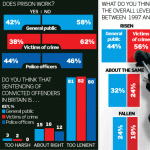Rioting in Britain – A Criminal Justice System Out of Control?
The below are the authors’ personal views and not necessarily representative of Birmingham University or of the London Probation Trust.
The recent disturbances across many key cities of Britain have led media commentators, politicians, senior police officers and others to consider the causes of the surprising, and even, shocking series of events that took place. Whilst some of these incidents involved extreme forms of violence in the form of murder, physical assault, arson, gang-related violence, other incidents are not so easily classified – looting, handling stolen goods, accepting items that had been looted by others. These sets of behaviours have been presented in media accounts as amoral, as people getting kicks out of lawless behaviour, as a symptom of a society whereby parents have lost control of their children.
The criminal justice responses in the aftermath of the riots have been rushed through, indicative of the kind of society we live in today – a society that looks for immediate responses without any thought about longer-term impacts. Magistrates courts have been kept open overnight in order to process as many of the thousands of people arrested as quickly as possible. There has been little reflection about what kind of criminal justice responses there should be, particularly in relation to non-violent, largely opportunistic, behaviours. No wonder then that an excessively punitive response has gained ground. There are many media accounts of people receiving stiff sentences for their actions – like the woman who had been woken in the middle of the night by her flatmate bringing in stolen goods to her flat. She tried on some clothes and decided to keep a pair of shorts; this woman received a five month prison sentence for not insisting that the stolen goods were returned straightaway. This seems like a criminal justice system out of control, being driven by a non-rational emotional grasping for security and control in an era of insecurity. Yet contrast this with the rather lenient approach shown to MPs found opportunistically taking advantage of their expenses claims!
The criminal justice reaction has been to deter further offenders by delivering custodial sentences. This may, indeed, act as a deterrent for some to get involved in similar offences for fear of being caught and sent to prison. But it will also serve to anger some who see it is an over-reaction from the authorities, marginalising those already on the fringes of society and disengaging those who may lose jobs, homes or family through incarceration. It will also do nothing for those communities that have been damaged and for individual victims who have been devastated by the disturbances.
There are more appropriate sentencing solutions. These are recommended through probation reports which can be requested by the sentencer. The reports will look at the offender’s social and criminogenic needs so as to produce a holistic approach of deterrence, rehabilitation and public protection. In this case making offenders visibly and physically payback to communities and victims, and helping and showing others that crime will be punished. The courts have been driven by the media and Government response to deliver instant justice and asking for reports could postpone the sentencing for several weeks so there have been less Community Sentences. The notion of paying back to the community is captured within the criminal justice system through the various community sentences that are available, including an order to carry out restorative justice in the community.
Restorative Justice could be used to get offenders, with the victim, to look at the impact of the offence now and in the future and attempt to resolve issues surrounding it. This is a specific intervention and a thorough assessment is needed to make sure it is a suitable process for both offender and victim before moving forward. It does confront offenders with the consequences of their actions and puts a human face to the misery and suffering these offences bring. A more appropriate sentence for most individuals and communities would be to get individuals to repair the damage they have done during the disturbances of last week and to clean up those areas affected. This can be done through Community Orders
A sentence of a Community Order, with between 40 and 300 Community Payback hours, can be used to make offenders work on supervised projects in local communities. This ensures that the offender has a “buy in” to the project and is less likley to damage it in the future. The high visibility nature of the work discourages others from offending by deterring them from wanting to be seen by their family and friends. Offenders sentenced to a community order serve their whole sentence in the community rather than prison. But they could be sent to prison if they do not comply with the order. An order can have combinations of 12 requirements attached to deal with the offenders on an individual basis and cover all areas of concern. These can be around drugs, alcohol, mental health include control elements for public protection such as curfew, prohibited areas. A custodial sentence, if thought inevitable by the court, can be suspended and a requirement to carry out Community Payback hours added.
Community Orders allow the offender to continue to work, attend education whilst reminding them of their obligation to the community. The community sees them being punished but also sees them repairing damage and working to support victims. The flexibility of Community Orders enables criminogenic or social needs to be addressed by probation officers helping with housing, education and looking at offending behaviour. Surely this is a more enlightened approach to the disturbances in Britain, one which links in closely with the Big Society?







